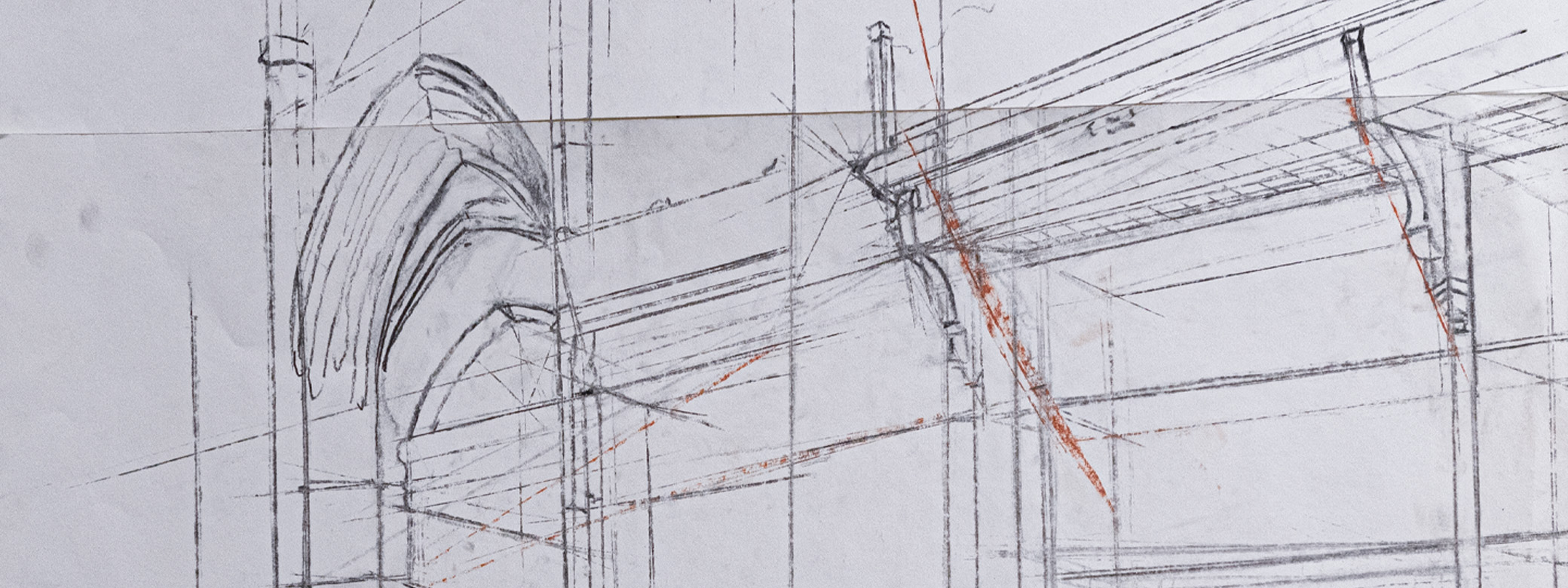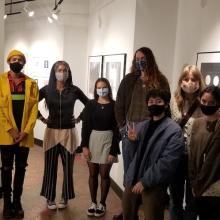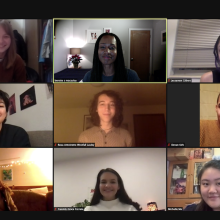The Henry Art Gallery and the School of Art + Art History + Design have long partnered on educational projects. One of these is the Museum Guide Program and its internship course. Starting in autumn quarter, eight students joined program manager Berette Macaulay for weekly sessions that introduced the students to the work of contemporary art interpretation and community engagement within a museum setting. Due to the pandemic, classes were normally on Zoom, but they did manage one in-person outing in late October. This was a visit to Photographic Center Northwest to view the exhibition titled Examining the American Dream. The internship course continues in winter and spring quarters with less frequent seminar sessions and individual projects. We asked four of the interns to write about their experience:
Grace Fletcher
I was attracted to the student guide program because it seemed like the perfect blend of my two majors: communication and art history. As the process evolved, I wanted to make art more accessible and to have conversations that allowed us to see the world in new ways. The focus of the class/internship is on the subjective, or my own personal experiences and how those experiences enrich my interpretations of art. We are trying to move away from the concept of museums as neutral, objective spaces of truth.
Throughout the quarter, we practiced presenting, and I honestly struggled to be myself and to draw from my own experiences because I was worried I would make a mistake. I talked to Berette Macaulay, our teacher for the program, who has also been such a mentor during this time of uncertainty and stress. She gave some advice that has stuck with me through subsequent presentations and talks: that sharing information and receiving information from others is an exchange and a gift. By sharing my connections and associations to exhibits, I can help invite others to share their own personal experiences. It's about creating a conversation and allowing for different associations and ideas to surface.
The guide program has already taught me that the most interesting speakers are the ones who speak on their own interests and passions, who are vulnerable and open to discussion. What I bring to the program is a desire to converse and share my ideas and, in return, I look forward to learning from conversations with the public and continuing to make friends along the way. As for the future, everything feels up in the air at the moment but the lessons of connection and building relationships will serve me well no matter where I land.
Devan Kirk
I’m an Art (Photo/Media), Anthropology, and Art History student in my senior year at UW. This background is what ;pulled me into this opportunity. I’ve always been fascinated with museums, and I want to understand them on a deeper level. During the summer of 2019, I had the opportunity to study abroad in Europe, and we visited museums, galleries, and exhibition spaces almost every day. Exhibits, curation, maintenance, or anything else related to the pieces, artifacts, and history inside museums have always astounded me, and the time that I spent in Europe acted as a catalyst to my interests in museums.
I've learned so far that there’s a lot more to museum upkeep and curation than I thought. Locating the voices that are trying to tell you the story that the museum offers is a difficult process, and it’s something we definitely have to learn either through exposure to museums or in a formal education setting. Learning basic public speaking skills has also been fun! It’s most definitely a skill to be able to corral a group together and cohesively, coherently, and concisely explain an exhibition. There’s a lot that happens behind those talks and especially a lot that I took for granted.
As for what I can contribute, being someone who has worked in a museum before this opportunity and has assisted on tours before, I can use what I learned in that space here. Before I was at the Henry, I actually worked not too far away at the Burke Museum. I was an intern for the Culture Department, and I helped around where I could. Sometimes that meant doing inventory on pieces being moved into the new building, doing item upkeep, or assisting on tours. There are plenty of parallels between the Burke and the Henry and applying what I learned is important.
Lastly, this program will definitely help with connections in the museum world. The Henry and Burke are world renown institutions, and we have most definitely had the chance to meet and chat with amazing artists, curators, and directors in this program. Understanding what they do is important, but also keeping the connections that we make is just as important!
Jessamyn Gilbert
I was drawn to the student guide program after receiving an email sent out to the majors in Art, Art History, and Design. After a couple years of being in and out of college, I had lost a bit of direction in what I was doing and how I was learning. I had declared a major in Art History almost immediately after I transferred to UW in the autumn of 2018, but I had since lost touch with a sense of purpose and inspiration, causing me to drift from the arts entirely. Then I got that email from the School, and I was drawn at the possibility of reconnecting with one of the very core components of myself: my relationship with the arts.
When we began meeting as a group this past September, our Thursday evening class periods quickly became the highlight of my week. Not only do we engage with topics close to my heart, but the space we create together has a sense of connection and intimacy that only exists when a deep trust and understanding is present. I have learned that examination of art and exhibitions makes this intimacy possible. I have learned that I am the most vulnerable when I am connecting to art and other artists.
I have since re-centered the remainder of my undergraduate experience to Art History. The Henry’s student guide program has offered me a glimpse into what it feels like to let go of external expectations of what we are told to do with our lives, and, instead, to re-engage with the parts of ourselves that are central to our identities. Within this comes a vulnerability that has forced me to reckon with parts of my identity that are uncomfortable. Not to mention a reckoning with the colonialist history of the institutions of galleries and museums that are equally uncomfortable and even disturbing. I am eternally grateful for this opportunity of deep growth and hopefully can encourage growth in others as well.
Michelle Ma
Curiosity has always been a big motive behind many of my actions. Whether it’s finishing my college education in a different country or new mediums to try in my artworks, I like finding the answers to my whys and whats. I was blessed to have the opportunity to visit several museums around the world through the art study abroad program. While knowledge poured into my brain new, questions also formed at the same time. It was then that I came across the Henry internship program and decided to learn more about the inter-working of art museums by joining one.
The most surprising thing I found out after joining the program is actually how diverse my cohort is in terms of our interests and our majors. I foolishly assumed that most of us would be from Art majors. However, I am so grateful that this program pushed me out of my comfort zone to discuss more about the current social and political issues.
As someone who grew up in Taiwan and has lived in multiple cities in the U.S., I constantly compare and reflect on the different cultures that I've experienced. I think when two strange things collide, it is one of the best ways to innovate ideas. I also learned to withhold my judgment and keep a very open mind. I honestly believe the key to communication is empathy, and we can only practice our empathy by not having an objective and being a good listener.
To be completely honest, as an Interdisciplinary Visual Art major, I am still a bit fuzzy about my next step after graduating. I am very grateful that the program plays a role in helping me figure out my next step, and I can only say that I will try to catch on to all the opportunities that I can get.


